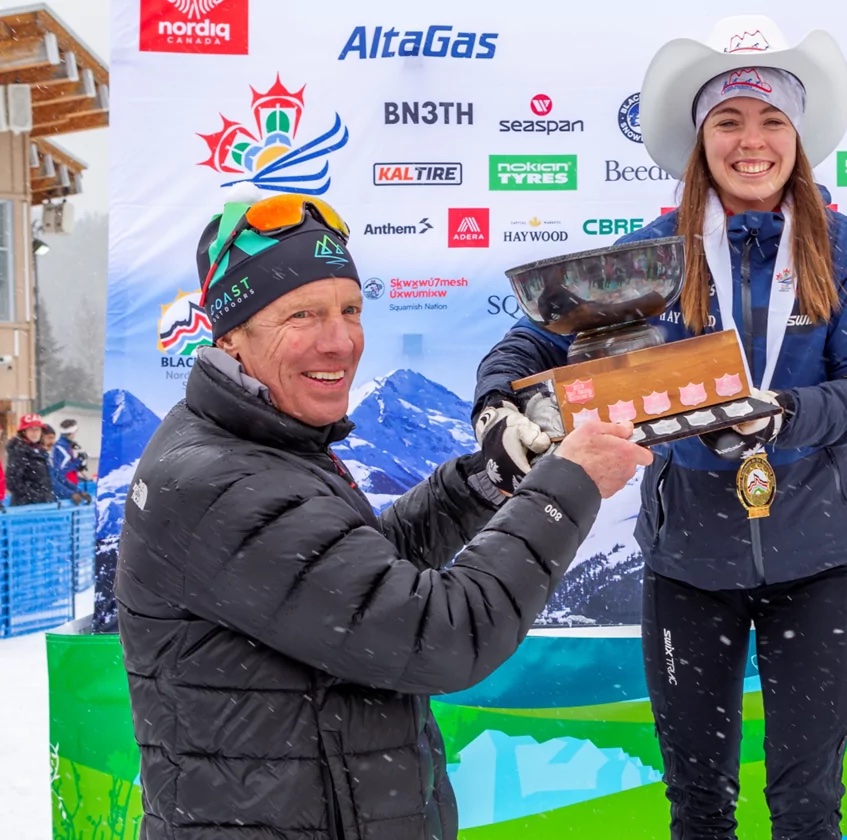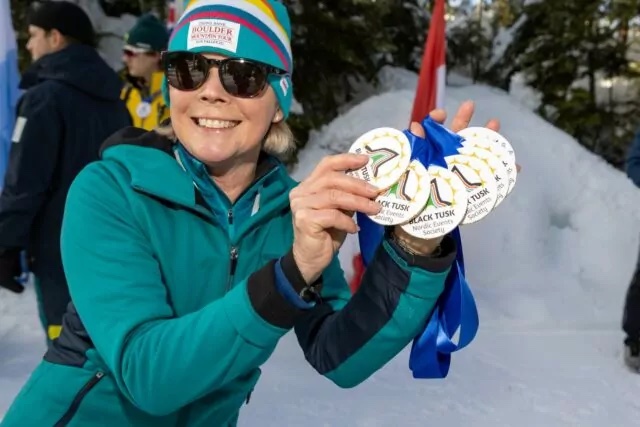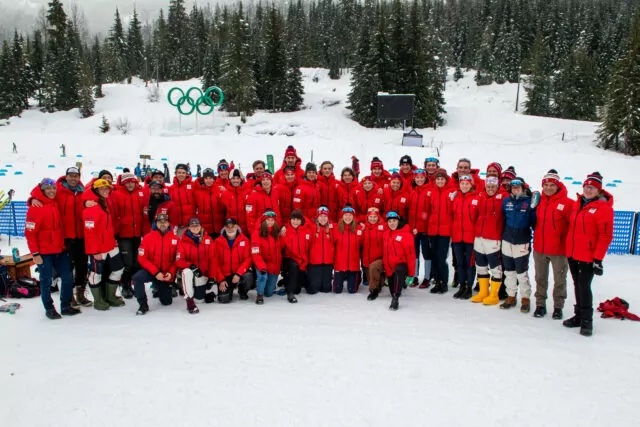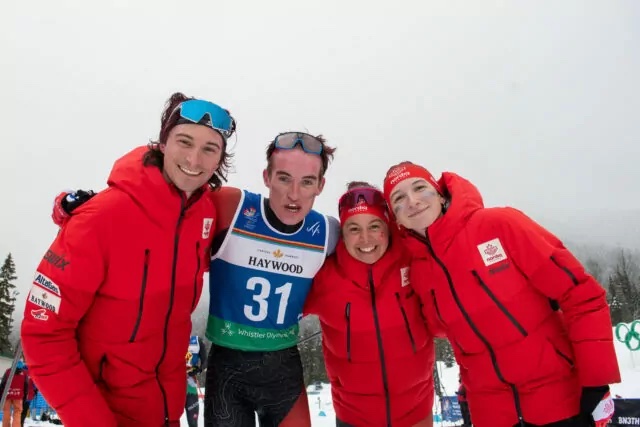 Championing Development: The Carter Families Decision to Save the 2023 FIS Nordic Junior & U23 World Ski Championships.
Championing Development: The Carter Families Decision to Save the 2023 FIS Nordic Junior & U23 World Ski Championships.
JUNE 12, 2024
Reid Carter had a decision to make. Four months before the first race start of the Nordic Junior & U23 World Ski Championships in Whistler, the event was in jeopardy of being shut down. Carter was torn. Fold or fight. He hadn’t established the Black Tusk Nordic Events Society to walk away with the dream of Canada hosting the prestigious event unfulfilled. A long-time cross country skier, and Division chair of Cross Country BC, Carter had been recruited Georgia Manhard, a renowned volunteer in the ski community, to spearhead the initiative to bring the FIS Nordic Junior and U23 World Ski Championships to Whistler. A year before the Championships, Black Tusk Nordic hosted the 2022 Nordiq Canada Ski Nationals as a dry run for the major event. The 2022 Nationals event hosted 1,200 athletes, 400 coaches and wax technicians and wouldn’t have been possible without the dedication of volunteers who’d committed their time and talents.
“You don’t want to blow that up, that amazing group of people,’ marvels Carter. With the Championship event on the line, and hundreds of athletes, coaches, wax techs, and support staff from around the world unsure if they would be heading to Canada for the championships, the decision was made. “My wife said to me: ‘You’ve been at this three years. You know you’re going to hold it. We’re very fortunate. We should just pick up the difference.’
“I thought about it for a moment, and I told her: ‘I think you’re right.’ And we were good. When your partner says something like that, it’s pretty wonderful and makes things much easier.”
The couple donated $1.3 million to save the event.
“The big shout-out,’ acknowledges Carter, “should go to my wife, Laura. I could see what the budget was going to look like for the Worlds, and I had to make a decision – hold them or not hold them. Being honest, if at that point we said we weren’t going to hold it, it would be a long time before FIS gave Canada an event again.”
 “We did incredibly well fundraising with many generous donors when you look at things,’’ reflects Carter. “The problem is the Sea-to-Sky Corridor is a very expensive place to hold an event.”
“We did incredibly well fundraising with many generous donors when you look at things,’’ reflects Carter. “The problem is the Sea-to-Sky Corridor is a very expensive place to hold an event.”
A sampling of the costs provides a glimpse into the budget for such a large endeavour: $950,000 in food services, $900,000 for accommodation, $265,000 in transportation, $344,000 for broadcast and photography, and $375,000 on supplies such as temporary tents and trailers.
“People who suggest you should just go out and find more corporate sponsors need to understand they simply don’t exist.” explains Carter “Rossignol, Salomon, Lanctot, were all great partners in this along with several others. But a FIS event like this has a budget of approximately $3.2 million and finding sponsors that can make a business case for larger scale investment is challenging.”
Despite the cost, the Nordic Junior and U23 World Ski Championships were a huge success from both competitive and experienced perspectives. Thirty-six nations, 460 athletes and 350 team trainers, coaches and FIS officials attended. The competition was broadcast live on nine TV stations in Scandinavia and Europe, along with a CBC Sports livestream. “Expensive but it really changes the impact,’’ notes Carter. “It was on TV in Europe, up on the website for a long time afterwards, and it’s still on YouTube”. Three hundred and fifty volunteers gave their time to work at the Nordic Junior and U23 World Ski Championships. A 15-vendor marketplace in the finish line stadium parking lot gave the event site an Olympic feel.


Carter singles out the hiring of John Aalberg, a Norwegian-born American cross-country skier who competed for the USA at the 1992 and ’94 Winter Olympics and has since designed and staged a slew of major competitions, as pivotal in moving the project forward. The initial stages of planning, Carter admits, had been a bit of a trial.
“That (hire) was in September ’21,’’ recalls Carter. “John had put on all the major events, designed Whistler Olympic Park, the ski jump, nordic combined and cross country courses for Beijing and other Olympics. “He agreed to be the project manager for an exceptionally generous amount – almost as a volunteer. As soon as we had John, everything fell into place quickly. We were in great shape.” Aalberg brought his Olympic, Paralympic and World Championship “know everyone and know everything” pedigree to the project.
“The Nordic Junior and U23 World Ski Championships are probably the one that’s the most work of any event you can put on” Aalberg explains. “I’ve done Olympic Games, but I had a staff of over 200 people reporting to me. I was in charge of Callaghan Valley, (for the 2010 Vancouver Winter Games), all the venues up there, and had a huge staff and 2,500 volunteers. “But for the Nordic Junior and U23 World Ski Championships… “there are more athletes and coaches than an Olympics, yet almost the same number of events with far less staff. “It all depends on your budget and the available human resources. “Obviously without Reid and his family’s contribution, these events wouldn’t have happened. We all know that.” said Aalberg.
The list of invaluable people who committed to the project is lengthy: Norman Laube (Black Tusk Nordic Events Society Chair), Jake Weaver (chief of competition), Rick Smith (chief of ski jumping), Morna Fraser (volunteer co-ordinator), Nancy Richard (marketing and communications), Dirk Rohde (venue operations), Cynthia Sully (special events co-ordinator), Tim Hope and Nadine Brandt (Whistler Olympic Park liaisons), Shera Clement (finance director), Ian Lowe (accommodation), and so many more. “It’s an experienced and talented pool around the Vancouver-Whistler area that you can call on,” praises Carter. “A National Championship? No problem. A World Junior and U23 Championships? No problem.” That degree of care and commitment resonated with everyone gathered at Whistler. The reviews during and after the event? Unanimous raves.
“For me, I talk to the teams and the coaches and by the looks on their faces, I know the truth,’ says Aalberg. “By that, I can tell if it’s been good or not. I trust them. And at those Championships those faces told me: ‘This is one of the best.’”
“That’s what you have to do at a big international event. That human feeling we all strive for – to have a good time, the people you meet, the friendships you make, to think we’ve helped out in making a difference at an event for the people on hand competing or those watching.”
The importance of hosting large international events on Canadian snow can’t be understated. “These events are so great for training coaches, building programs, and developing athletes…” “I think everyone is keen to know what the next one is.” says Carter.
In recognition of their support of cross-country skiing in Canada, Nordiq Canada is introducing the Reid and Laura Carter Award to honour all they have done in nurturing the talents of development athletes. The award will be presented to the top U20 male and female aggregate winners at the Canadian Ski Nationals starting in March of 2025. When asked about his future plans to continue to support athlete development in the ski community, Carters response is resolute: “I’ll definitely continue. I’m still chairing Cross Country B.C. We hosted a Teck B.C. Cup this year and will likely have Westerns next year. I’ve been involved in youth and development sports my whole life. And I’ve been incredibly fortunate. I’m not done yet but I’m very happy to be able to give back.”
Article by Nordiq Canada

